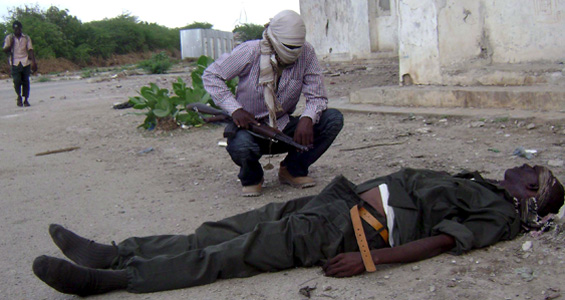Somalis caught in the crossfire
Civilians in Mogadishu bear the brunt of the government’s response to attacks.

 |
|
Battles between government troops and opposition fighters has a heavy toll on civilians [EPA] |
In a refugee camp in northern Kenya, a 14-year-old Somali boy recounts the moment that his entire family were killed in Mogadishu.
“When I came home from the duksi [Koranic school] I found our house had been hit,” he says.
“My mother and father were killed. I think my four brothers were killed as well – I saw pieces of their hands and legs near the part of the house that we used for resting.”
The house had been struck by a mortar during an exchange of fire between Somalia’s Western-backed transitional federal government forces and the armed opposition groups that control large swathes of the country.
Fighting, death and destruction on the streets of the Somali capital is nothing new; but now human rights groups are warning that civilian suffering is being fuelled by weapons shipments from the very countries that say they want to bring peace to Somalia.
The US government shipped around 40 tonnes of weapons and ammunition to the transitional government last year, including mortar rounds, in a bid to bolster its beleagured position in the face of increasingly powerful armed opposition groups like Al-Shabaab and Hizbul Islam.
The US believes the armed groups fighting to topple the government have ties to al-Qaeda and have been alarmed by their takeover of vast swathes of the country.
War crimes
But government forces, and the African Union troops who are tasked with supporting them, have used the weapons to commit what human rights groups say are clear breaches of the laws of war.
Human Rights Watch says that civilians in the Somali capital are bearing the brunt of the government’s response to increasingly bloody rebel attacks in and around the capital.
In a report published on Monday the group has called for a cessation of the shipment of mortars to the country until “measures are implemented to ensure their use complies with international humanitarian law.”
The watchdog says it has identified a pattern of mortar use from both sides that is illegal under international law.
“Fighters drive to a firing location, hastily assemble the weapons and then lob one or more rounds in the vague direction of TFG [transitional federal government] and Amisom [joint African Union-UN peacekeeping mission] installations,” the report says.
“They then immediately pack their weapons and flee. While the mortar attacks rarely strike their target, they subject civilians in the firing location to a counter-attack.”
It is a pattern of violence that Mogadishu residents are depressingly familar with.
“They would come, fire, and move on,” one young woman, also a refugee, told Human Rights Watch researchers.
“When the return fire came, al-Shabaab had already left. We would run in case out house got hit. I was terrified.”
The report says that the armed opposition – the largest of which is al-Shabaab, but also includes smaller groups like Hizbul Islam – deliberately draw fire onto civilian areas in an effort to bolster anti-government feeling amongst residents, itself a crime under the laws of war.
Deadly tactics
International law requires parties to a conflict to take all feasible precautions to protect civilians from the effects of the fighting. This includes locating military equipment in or around civilian areas.
But the groups’ leaders openly admit their tactic of using civilians as unwilling pawns in the conflict engulfing Mogadishu.
|
“The population acts like a shield and we operate out of them.” Hassan Dahir Aweys, Hizbul Islam leader. |
In an interview last September, Hassan Dahir Aweys, Hizbul Islam leader, said that the civilian population were a useful “shield” in the city.
“The population acts like a shield, and we operate out of them” he said.
The tactic is as deadly as it is effective.
Earlier this year, a Medicins sans Frontieres-supported hospital in Mogadishu treated 89 people for blast injuries caused by indiscriminate shelling in just five days – including 52 women and children.
The hospital was located in an opposition controlled area; the firing had come from the Western-backed government forces.
International criticism for the tactics of al-Shabaab, Hizbul Islam and other opposition groups in Somalia has been sustained and severe.
But when government and African Union forces have undertaken similar tactics the reponse from the international community has been muted.
“The strong backing for the transitional government by the US, the EU, the AU, and the UN political office for Somalia has led these actors to quickly condemn serious abuses by al-Shabaab, but effective turn a blind eye to abuses by the transitional forces in Mogadishu even though no party to the fighting has used the weapons in accordance with the laws of war,” the report says.
Many experts believe that the transitional government would collapse without the support of the international community and AU troops.
The US government says it is providing the weapons on an “urgent” basis, and points out all shipments have taken place within the terms of a UN arms embargo to the country.
But human rights groups reject the idea the government should be given weapons to uses against the civilian population, and say it should be held accountable for its actions.
“All sides are responsible for laws of war violations that continue unabated in Mogadishu,” Georgette Gagnon, Africa director at Human Rights Watch, says.
“There is no easy way to solves the crisis in Somalia. But outside powers should address abuses by all sides instead of ignoring those committed by their allies.”